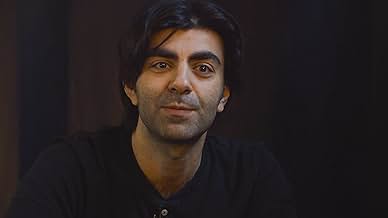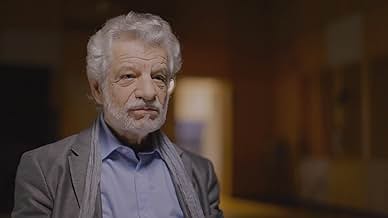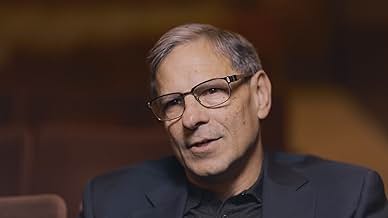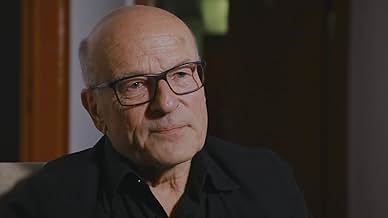VALUTAZIONE IMDb
7,3/10
926
LA TUA VALUTAZIONE
Aggiungi una trama nella tua linguaFocuses on the Weimar Republic (1918-1933) and its 'collective spirit' in cinema. The purpose of film as a cultural tool is examined. Based on celebrated sociologist Siegfried Kracauer's sem... Leggi tuttoFocuses on the Weimar Republic (1918-1933) and its 'collective spirit' in cinema. The purpose of film as a cultural tool is examined. Based on celebrated sociologist Siegfried Kracauer's seminal book 'From Caligari to Hitler' (1947).Focuses on the Weimar Republic (1918-1933) and its 'collective spirit' in cinema. The purpose of film as a cultural tool is examined. Based on celebrated sociologist Siegfried Kracauer's seminal book 'From Caligari to Hitler' (1947).
- Regia
- Sceneggiatura
- Star
- Premi
- 1 vittoria e 1 candidatura in totale
Fritz Lang
- Self
- (filmato d'archivio)
- (voce)
Alfred Abel
- Self
- (filmato d'archivio)
Gertrud Arnold
- Self
- (filmato d'archivio)
Elisabeth Bergner
- Self
- (filmato d'archivio)
Brigitte Borchert
- Self
- (filmato d'archivio)
Bertolt Brecht
- Self
- (filmato d'archivio)
Louise Brooks
- Self
- (filmato d'archivio)
Lil Dagover
- Self
- (filmato d'archivio)
Lya De Putti
- Self
- (filmato d'archivio)
Carl de Vogt
- Self
- (filmato d'archivio)
Marlene Dietrich
- Self
- (filmato d'archivio)
Recensioni in evidenza
You'll get to see amazing pictures of 1920s and 30s Berlin and Germany and get to know a few influential movies of the Weimar Republic period of German cinema along with some less known examples in the latter half. Unfortunately the basis for the documentary and narration is based on Siegfried Kracauer's book "From Caligari to Hitler: A Psychological History of the German Film" published in 1947, which is filled with Postmodernist gibberish and sociologist analysis and interpretation through a decidedly Frankfurt School lens describing the time period, directors, other people involved and the movies, often even self-contradictorily so. A few of the interviewees picked also don't seem to hold any deeper insights into the time period and it's questionable what they add to the documentary or for what reason they were chosen.
We owe so much to the Germans in terms of films. So many techniques used over there, the lighting, the shadows, the dark ambiance, we owe to them, in large part because many of their filmmakers fled Germany circa 1933.
I found this a little heavy going but quite good. Through film clips and interviews, the documentary tells us about German cinema at a time during the free Weimar period, the golden era of which was 1924-1929.
This was a time of stable economy, culture renaissance, and new ideas. Women were more Americanized, the cabarets and musicals were popular.
The documentary begins after World War I where there was great upheaval. Siefried Kracauer wrote 'From Caligari to Hitler' in 1947, on which this documentary is based.
We see all the great Weimar directors: the versatile Fritz Lang, G. W. Pabst, F. W. Murnau, Ernst Lubitsch, the Siodmak brothers, and writers, Billy Wilder being one.
And we see their stars: Dietrich, Emil Jannings, Louise Brooks, Lilian Harvey, Willy Fritsch (Harvey and Frisch were known as the "dream couple" in film), and even Leni Riefenstahl, who appeared in what are known as "mountain movies."
And there are clips from the classics: "Metropolis" (1927), "The Cabinet of Dr. Caligari" (1920), "M" (1931), "Nosferatu" (1922), "People on Sunday" (1930), and "Berlin, Symphony of a Metropolis" (1927).
Kracauer's thesis, gone into here, was that the films predict the rise of the National Socialist Party as well as the stock market crash (in several films, before 1929, the stock market crashes). He says that the budding film industry predicted the coming of the National Socialist Party. Many films had megalomaniacs or evil men, and mob order.
It is a fascinating thesis and probably true. I think it might not be just German films. "Why We Fight" in 1933, predicted WW II and during a demonstration, one sees a swastika and a Japanese sun.
Also, if one remembers, when The China Syndrome came out, nuclear power executives lambasted the picture as being "sheer fiction" and a "character assassination of an entire industry". Then twelve days after the movie's release, the Three Mile Island nuclear accident occurred.
'Arlington Road' from 1999 focuses on the idea of how much we actually know about our neighbors. The central theme is the threat of homegrown terror, but it's built around the notion of what we view as plausible vs. Implausible. In a pre-9/11 world, the film serves almost as a cautionary tale. It was dismissed as preposterous.
And don't forget, the Simpsons did an episode about "President Trump" in 2000.
Those are films dealing with specific instances, but I'm sure if one goes back and studies films from the past, there are themes that became relevant later.
If it's in the air, it's in the air. Fascinating nonetheless.
I found this a little heavy going but quite good. Through film clips and interviews, the documentary tells us about German cinema at a time during the free Weimar period, the golden era of which was 1924-1929.
This was a time of stable economy, culture renaissance, and new ideas. Women were more Americanized, the cabarets and musicals were popular.
The documentary begins after World War I where there was great upheaval. Siefried Kracauer wrote 'From Caligari to Hitler' in 1947, on which this documentary is based.
We see all the great Weimar directors: the versatile Fritz Lang, G. W. Pabst, F. W. Murnau, Ernst Lubitsch, the Siodmak brothers, and writers, Billy Wilder being one.
And we see their stars: Dietrich, Emil Jannings, Louise Brooks, Lilian Harvey, Willy Fritsch (Harvey and Frisch were known as the "dream couple" in film), and even Leni Riefenstahl, who appeared in what are known as "mountain movies."
And there are clips from the classics: "Metropolis" (1927), "The Cabinet of Dr. Caligari" (1920), "M" (1931), "Nosferatu" (1922), "People on Sunday" (1930), and "Berlin, Symphony of a Metropolis" (1927).
Kracauer's thesis, gone into here, was that the films predict the rise of the National Socialist Party as well as the stock market crash (in several films, before 1929, the stock market crashes). He says that the budding film industry predicted the coming of the National Socialist Party. Many films had megalomaniacs or evil men, and mob order.
It is a fascinating thesis and probably true. I think it might not be just German films. "Why We Fight" in 1933, predicted WW II and during a demonstration, one sees a swastika and a Japanese sun.
Also, if one remembers, when The China Syndrome came out, nuclear power executives lambasted the picture as being "sheer fiction" and a "character assassination of an entire industry". Then twelve days after the movie's release, the Three Mile Island nuclear accident occurred.
'Arlington Road' from 1999 focuses on the idea of how much we actually know about our neighbors. The central theme is the threat of homegrown terror, but it's built around the notion of what we view as plausible vs. Implausible. In a pre-9/11 world, the film serves almost as a cautionary tale. It was dismissed as preposterous.
And don't forget, the Simpsons did an episode about "President Trump" in 2000.
Those are films dealing with specific instances, but I'm sure if one goes back and studies films from the past, there are themes that became relevant later.
If it's in the air, it's in the air. Fascinating nonetheless.
I'm glad I got to see this, having read Kracauer's book about twelve years ago. It is a bit stuffy and pedantic, but still a marvelous look at a huge period in cinema, the Weimar. We are informed of the movement in Germany that took place after the First World War. Germany, decimated by the restrictions and punishments in Versailles, began to rebuild. The problem was that they were building their future on sand. Meaningless jobs and overpayment for work that really contributed little to the restoration had to have an end. Soon inflation reared its ugly head. Of course, the Jews were going to be blamed. Hitler took care of that. Kracauer's thesis is that the budding film industry predicted the coming of the National Socialist Party. He points particularly to the close knittedness of the youth that were about to be disenfranchised. He asks where they will be in thirty years. Also, many times of the films of the time presented us with megalomaniacs or those of evil intent. Women seemed to be diminished in the films. Also, there was a sort of mob order to the characters. Positives of the documentary are that it is nicely ordered to prove the point. There are numerous clips to support the thesis. I'm greedy, however, and would like to have seen a bit more. Nevertheless, the quality of the clips is quite good. It has led me to take a further look at some of the Fritz Lang and F. W. Murnau films that are seldom seen. I'm glad the TCM has seen fit to do more than show their catalogue of films. Let's hope for even more of these kinds of things.
What a great documentary this is a Eureka Blu-ray Hitler's Hollywood. Actually it has two made by Rudiger Suchsland from the splendid book, 'From Caligari to Hitler' written by Siegfried Keacauer and covers Germany society and films between 1921-1933. Although this one is more or less between 1918 and 1933 and it is so well done. Brilliantly narrated and so well put together by the shots of old film and, of course the amazing films themselves. There is a lot of Fritz Lang but scores of others and so interesting with stills and movies, black&white and also some tinted. There are wonderful historical shots of the streets and some dazzling Roaring Twenties and then the emergence of the Nazis. We also had moments of Marlene Dietrich, Louise Brooks and Leni Riefenstahl and it is so impressive and delightful I shall have to watch the other one - Hitler's Hollywood (2017) covering the years 1933-1945.
From Caligari to Hitler: German Cinema in the Age of the Masses (2014)
*** 1/2 (out of 4)
Entertaining documentary that explores German cinema before Hitler came into play. The Weimar Republic is looked at from the span of 1919-1933 and we hear about countless careers including Fritz Lang, F.W. Murnau, Georg Wilhelm Pabst, Ernst Luitsch, Marlene Dietrich, Billy Wilder and Robert Wiene among others.
If you're a fan of German cinema then you'll certainly want to watch this documentary that clocks in just under two hours. There are a lot of clips from various movies shown but we also get interviews with some German historians who discuss these films and their impact around the world. I will admit that some of the narration seemed to try and be "too intelligent" by throwing certain thoughts out there that just didn't really fit with the films.
With that said, there's no question that this gives you a terrific look at German cinema during this period and there are some theories that if you view these films they give you an idea into the mindset of German's and they might explain why Hitler rose to power. Certainly some interesting things to think about. FROM CALIGARI TO Hitler is certainly worth watching.
*** 1/2 (out of 4)
Entertaining documentary that explores German cinema before Hitler came into play. The Weimar Republic is looked at from the span of 1919-1933 and we hear about countless careers including Fritz Lang, F.W. Murnau, Georg Wilhelm Pabst, Ernst Luitsch, Marlene Dietrich, Billy Wilder and Robert Wiene among others.
If you're a fan of German cinema then you'll certainly want to watch this documentary that clocks in just under two hours. There are a lot of clips from various movies shown but we also get interviews with some German historians who discuss these films and their impact around the world. I will admit that some of the narration seemed to try and be "too intelligent" by throwing certain thoughts out there that just didn't really fit with the films.
With that said, there's no question that this gives you a terrific look at German cinema during this period and there are some theories that if you view these films they give you an idea into the mindset of German's and they might explain why Hitler rose to power. Certainly some interesting things to think about. FROM CALIGARI TO Hitler is certainly worth watching.
Lo sapevi?
- Quiz[Suchsland on Von Caligari zu Hitler: Das deutsche Kino im Zeitalter der Massen (2014)] Youth, freedom, irony, curiosity: Weimar is Modernity at its best and 'the' time of German cinema: By far the prime and richest period of our filmmaking. Cinema mirrors the turbulent era of the Twenties. These movies had it all! But more or less everything of it is forgotten, reduced to two or three footnotes. I wanted to take us all on an adventurous trip to this lost time, a trip which should entertain, move, surprise and remind us all of an open wound in our past. Siegfried Kracauer, a forgotten genius of cultural critique, is the perfect guide to an era, which is fascinating in its contradictions. This fascination and, yes: my love for this time and its cinema, I hope to share.
- ConnessioniFeatures Gli occhi della mummia (1918)
- Colonne sonoreBerlin: Symphony of a Metropolis (Berlín. Die Sinfonie der Großstadt)
Composed and conducted by Timothy Brock
Performed by Washington Chamber Orchestra
I più visti
Accedi per valutare e creare un elenco di titoli salvati per ottenere consigli personalizzati
Dettagli
- Data di uscita
- Paese di origine
- Siti ufficiali
- Lingue
- Celebre anche come
- From Caligari to Hitler: German Cinema in the Age of the Masses
- Luoghi delle riprese
- Aziende produttrici
- Vedi altri crediti dell’azienda su IMDbPro
- Tempo di esecuzione1 ora 59 minuti
- Colore
- Proporzioni
- 1.78 : 1
Contribuisci a questa pagina
Suggerisci una modifica o aggiungi i contenuti mancanti

Divario superiore
By what name was Von Caligari zu Hitler: Das deutsche Kino im Zeitalter der Massen (2014) officially released in India in English?
Rispondi































